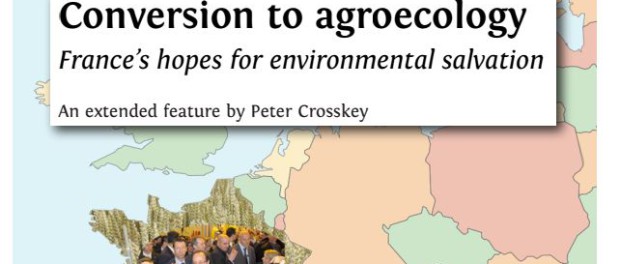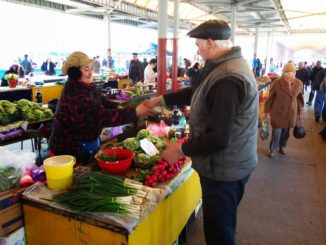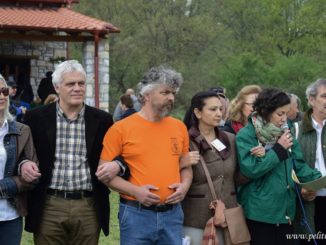Below is a pair of extracts from the publication Conversion to agroecology: France’s hopes for environmental salvation by ARC2020’s Peter Crosskey. Read our opening article on the 28 page ARC2020 document or download it in full.

The background to the Loi d’Avenir
Stéphane Le Foll started work at the French agriculture ministry in May 2012. When he arrived at Rue de Varenne his predecessor parted with the valedictory phrase: “Bon courage, Stéphane,”16 and a faint smile. On May 31, Charles Doux, founder of the eponymous poultry export group, put his business into administration.
This not-unexpected action threatened rural infrastructure across the country, with unpaid hauliers, unpaid vets, not to mention unpaid poultry producers. The new minister went into overdrive and, like a proverbial conjuring act, was obliged to pull not just one, but a series of rabbits out of an increasingly battered hat.
The Doux group business model was to provide day-old chicks to poultry farmers, who raised the birds to slaughter weight with feed supplied from a Doux feed mill, before they were delivered to a Doux abattoir by an out-sourced lorry driver, after which frozen oven-ready chickens were exported outside the European Union.
On the basis that the poultry was converted cereal feed, the CAP at that time allowed Doux to claim export restitutions for every last quintal of cereal fed to the birds while they were alive. Nor were the sums involved mere chicken feed, either.
It later emerged that the Doux group was one of the largest single beneficiaries of the CAP, banking more than EUR 50 million of export restitution payments in a single year before the business took a tumble.
While the Doux group survived the crisis, restructuring the business and shedding hundreds of jobs in a long drawn-out recovery phase, the episode served to leave a question mark over the received wisdom of large specialist, agricultural businesses being stronger than smaller, diversified ones, as well as questioning the kinds of risk that agriculture should be expected to run in the normal course of its business cycle.
While the Doux crash was not the sole driver for Stéphane Le Foll’s Loi d’Avenir pour l’Agriculture, l’Alimentation et la Forêt (Law for the Future of Agriculture, Food and the Forest) it provided a compelling argument for changing a dysfunctional set of policy objectives.
With a headline aim of applying agroecology on 200,000 holdings by 2025, it is a bold strategy in challenging times. When asked by journalists, half jokingly, why France had to have yet another farming law, Le Foll’s answer was completely serious: “Because we need one.”
A vision that starts with showing the way for future generations
With the catchline “produisons autrement” (let us produce in other ways), the Loi d’Avenir looks to agroecology for solutions to current problems. In the autumn of 2014 the French state employed over 200 new researchers and tutors to teach agroecology across the country as a core part of the national agricultural educational programme.
With 40% of France’s agricultural workforce either set to retire within five years or already past retirement age, there is a pressing need to train a new generation of farmers who can take on the nation’s farms and to Conversion to agroecology: France’s hopes for environmental salvation Page 18 of 28 create more jobs in the sector.
Stéphane Le Foll’s headline commitment to applying agroecology on 200,000 holdings by 2025 sounds like a bold piece of policymaking, but it is based on the minister’s reading of existing numbers. He is counting on the next generation of farmers implementing forward-looking strategies and stresses that: “…the crisis that we are going through requires us to put more effort [into agricultural education] to meet a major challenge and create jobs for young people in our country.”
The Loi d’Avenir includes promoting crop diversity and biodiversity as guiding principles. Being careful not to define agroecology too closely, it is being promoted through education and research. In addition, it encourages economic and environmental stakeholders to join forces and manage resources at a landscape level in cross-sector groups, called Groupements d’Intéret Economiques et Environmentaux (GIEE).
The law also makes a fundamental change in land policy, protecting farmland from competing land uses and to making it easier for young farmers to get started in agriculture. Both these aims are achieved by reorganising the regional farmland management bodies (known as SAFERs) which can now intervene in land sales to compulsorily purchase farmland that might otherwise be built over.
10 point checklist for agroecology
A local SAFER also helps young farmers get started in agriculture by assigning them land from its land bank. Rue de Varenne issued a 10-point checklist of agroecology’s key components. These are:
◆ Education: training the farmers of today and tomorrow.
◆Stakeholder involvement: developing Groupements d’Interêt Economiques et Environmentaux (GIEEs).
◆ Crops: reduce the use of pesticides.
◆ Biocontrols: or natural methods to protect crops, eg ladybirds to control aphids.
◆ Livestock: reduce the use of veterinary antibiotics.
◆ Bees: engage in developing sustainable beekeeping.
◆ Methanisation: extract value from livestock effluent.
◆ Organic: promote organic farming.
◆ Seeds: choose and select locally-adapted seed stock.
◆ Agroforestry: use trees to improve production.
Unlike some agricultural policies, the Loi d’Avenir takes public expectations of agriculture into account, requiring a degree of public accountability for spraying. The Loi d’Avenir sets out to protect vulnerable members of the population from exposure to crop chemicals, notably the young, the old and the sick. It will require hedges around fields to catch spray drift and users will be required to post warnings of upcoming crop treatments in public buildings, like schools, nurseries, retirement homes and clinics.
Providing such warnings are logged – and there is no reason why they should not be kept on record – there will be the opportunity to establish a publicly accessible audit trail to help epidemiologists in the event of public health incidents.
————-
Rue de Varenne and la France profonde | The chasm between expectations and what politicians can deliver
For some agricultural unions, the Loi d’Avenir is too little, too late, with blindspots that could still trip it up. The Confédération Paysanne (Conf’) speaks directly for those pushed aside by intensive farming. While many welcome a long-awaited political initiative to bring agriculture back into harmony with the environment, the Conf’ is alarmed at the ease with which good intentions can be waylaid by political expediency.
In February last year, the Conf’ greeted the minister’s announcement that this was the: “…Year One of agroecology” with incredulity.
“The drive for agroecology cannot sit alongside public policies which favour so-called ‘competitivity’, the industrialisation [of agriculture] [or] the exclusion of small or diversified farms.” Confédération Paysanne.
While containing “interesting elements” the Conf’ is disappointed that the minister’s plan for implementing agroecological farming lacks: “…systemic and territorial approaches … as well as social factors.” Its foundations are based on technical assumptions and “…leave no place for peasant know-how. The scale of farm holdings is not questioned, although its implications for the environment are well known.”
A number of peasant organisations have developed diagnostic frameworks for agroecological approaches, which they are asking the minister to use with peasants to “…really go in the direction of agroecology. And, to ensure that this policy makes sense and is more than just a communications exercise, it is essential to re-envisage agricultural policies in the light of agroecology.”
There is a genuine concern that the label agroecological will end up being overused indiscriminately, in much the same way as the term greening was applied to parts of the CAP. Mostly the bits that either got dropped by the wayside or are being lined up for “simplification” by the new agriculture commissioner Phil Hogan.





